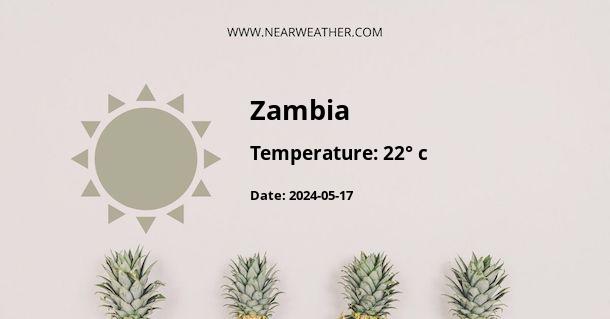Climate and Weather in the Republic of Zambia
Zambia, officially known as the Republic of Zambia, is a landlocked country located in Southern Africa. With its diverse landscapes and rich wildlife, Zambia attracts tourists from around the world. Understanding the climate and weather patterns of Zambia is crucial for travelers and locals alike. In this article, we will explore the climate and weather conditions in the Republic of Zambia throughout the year.
Geographical Factors
Zambia's climate is influenced by various geographical factors, including its location, terrain, and proximity to major bodies of water. The country is situated between latitudes 8°S and 18°S and longitudes 22°E and 34°E. It shares borders with several countries, including Zimbabwe, Botswana, Namibia, Angola, Democratic Republic of the Congo, Tanzania, Malawi, and Mozambique.
The terrain of Zambia is diverse, ranging from plateaus and mountains to valleys and plains. The country is home to several major rivers, including the Zambezi, Kafue, and Luangwa, which play a significant role in shaping its climate.
Seasonal Patterns
Zambia experiences distinct seasonal patterns throughout the year. The country has a tropical climate with a dry season and a rainy season.
Dry Season
The dry season in Zambia typically occurs between May and October. During this period, the weather is characterized by low rainfall and warm temperatures. The temperatures can range from 25°C (77°F) to 35°C (95°F), depending on the region.
One of the highlights of the dry season is the cool, dry breeze that blows across the country, providing relief from the heat. This season is ideal for wildlife viewing, as animals gather around water sources, making it easier to spot them.
Rainy Season
The rainy season in Zambia generally runs from November to April. This period is characterized by high rainfall and warm to hot temperatures. The average annual rainfall varies across the country, with the northern regions receiving more rainfall compared to the southern parts.
During the rainy season, temperatures can range from 20°C (68°F) to 30°C (86°F). Heavy rainfall can lead to flooding in some areas, especially near rivers and low-lying regions.
Regional Variations
Zambia's climate exhibits regional variations due to its diverse geography. Let's explore the climate conditions in different regions of the country:
1. Northern Zambia
The northern part of Zambia experiences a tropical wet and dry climate. This region receives the highest amount of rainfall compared to other parts of the country. The average annual rainfall in this region can exceed 1,000mm (39 inches). The temperatures in the northern region range from 20°C (68°F) to 30°C (86°F) during the rainy season.
2. Southern Zambia
Southern Zambia has a subtropical climate, characterized by hot summers and mild winters. The region receives relatively lower rainfall compared to the northern part. The average annual rainfall in this region ranges between 600mm (24 inches) and 1,000mm (39 inches). Temperatures during the rainy season range from 20°C (68°F) to 30°C (86°F).
3. Eastern Zambia
Eastern Zambia experiences a similar climate to the southern region. It has a subtropical climate with hot summers and mild winters. The average annual rainfall in this region ranges from 800mm (31 inches) to 1,200mm (47 inches).
4. Western Zambia
Western Zambia has a semi-arid climate with lower rainfall compared to other regions. The average annual rainfall in this region ranges from 400mm (16 inches) to 800mm (31 inches). Temperatures during the rainy season range from 20°C (68°F) to 30°C (86°F).
Extreme Weather Events
While Zambia generally experiences a predictable climate, the country is susceptible to some extreme weather events.
1. Droughts: Periodic droughts can occur in Zambia, primarily during the dry season. These droughts can have adverse effects on agriculture and water resources.
2. Floods: Heavy rainfall during the rainy season can lead to flooding, especially in low-lying areas and near rivers. These floods can cause damage to infrastructure and displace communities.
Weather Charts and Statistics
Providing visual representations of weather patterns and statistics can help us better understand Zambia's climate. The following charts illustrate the average monthly temperature and rainfall in the capital city, Lusaka, which can be considered as a representative location for the country:
1. Average Monthly Temperature in Lusaka
| Month | Jan | Feb | Mar | Apr | May | Jun | Jul | Aug | Sep | Oct | Nov | Dec |
|---|---|---|---|---|---|---|---|---|---|---|---|---|
| Average Temperature (°C) | 22 | 21 | 21 | 19 | 16 | 15 | 15 | 18 | 23 | 26 | 24 | 22 |
2. Average Monthly Rainfall in Lusaka
| Month | Jan | Feb | Mar | Apr | May | Jun | Jul | Aug | Sep | Oct | Nov | Dec |
|---|---|---|---|---|---|---|---|---|---|---|---|---|
| Average Rainfall (mm) | 223 | 177 | 107 | 30 | 4 | 0 | 0 | 0 | 8 | 45 | 156 | 214 |
Conclusion
The Republic of Zambia experiences a tropical climate with distinct dry and rainy seasons. The dry season, from May to October, offers warm temperatures and low rainfall, making it ideal for wildlife viewing. The rainy season, from November to April, brings high rainfall and warm to hot temperatures. Regional variations in climate exist due to the country's diverse geography.
While Zambia generally enjoys a predictable climate, it is essential to be aware of extreme weather events such as droughts and floods. Travelers and locals should stay informed about weather conditions and take necessary precautions when planning their activities.
A - Zambia's Latitude is -15.000000 & Longitude is 30.000000.
A - Weather in Zambia is 20° today.
A - Climate Conditions in Zambia shows moderate rain today.
A - Humidity in Zambia is 97% today.
A - Wind speed in Zambia is 4.9 km/h, flowing at 312° wind direction. today.
